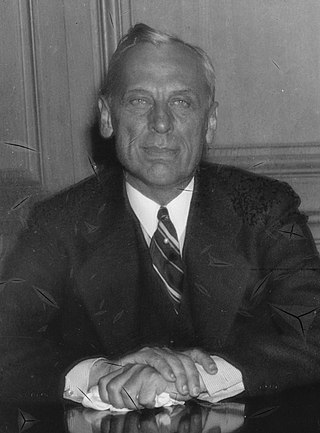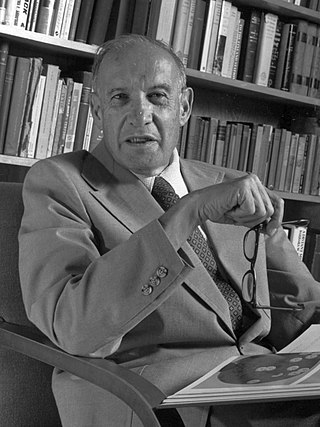Related Research Articles

Economics is a social science that studies the production, distribution, and consumption of goods and services.
Human capital is a concept used by economists to designate personal attributes considered useful in the production process. It encompasses employee knowledge, skills, know-how, good health, and education. Human capital has a substantial impact on individual earnings. Research indicates that human capital investments have high economic returns throughout childhood and young adulthood.

Alfred Pritchard Sloan Jr. was an American business executive in the automotive industry. He was a long-time president, chairman and CEO of General Motors Corporation. Sloan, first as a senior executive and later as the head of the organization, helped GM grow from the 1920s through the 1950s, decades when concepts such as the annual model change, brand architecture, industrial engineering, automotive design (styling), and planned obsolescence transformed the industry, and when the industry changed lifestyles and the built environment in America and throughout the world.

Information economy is an economy with an increased emphasis on informational activities and information industry, where information is valued as a capital good. The term was coined by Marc Porat, a graduate student at Stanford University, who would later co-found General Magic.
The knowledge economy, or knowledge-based economy, is an economic system in which the production of goods and services is based principally on knowledge-intensive activities that contribute to advancement in technical and scientific innovation. The key element of value is the greater dependence on human capital and intellectual property as the source of innovative ideas, information and practices. Organisations are required to capitalise on this "knowledge" in their production to stimulate and deepen the business development process. There is less reliance on physical input and natural resources. A knowledge-based economy relies on the crucial role of intangible assets within the organisations' settings in facilitating modern economic growth.
Outsourcing is an agreement in which one company hires another company to be responsible for a planned or existing activity which otherwise is or could be carried out internally, i.e. in-house, and sometimes involves transferring employees and assets from one firm to another. The term outsourcing, which came from the phrase outside resourcing, originated no later than 1981. The concept, which The Economist says has "made its presence felt since the time of the Second World War", often involves the contracting out of a business process, operational, and/or non-core functions, such as manufacturing, facility management, call center/call center support.
In the field of management, strategic management involves the formulation and implementation of the major goals and initiatives taken by an organization's managers on behalf of stakeholders, based on consideration of resources and an assessment of the internal and external environments in which the organization operates. Strategic management provides overall direction to an enterprise and involves specifying the organization's objectives, developing policies and plans to achieve those objectives, and then allocating resources to implement the plans. Academics and practicing managers have developed numerous models and frameworks to assist in strategic decision-making in the context of complex environments and competitive dynamics. Strategic management is not static in nature; the models can include a feedback loop to monitor execution and to inform the next round of planning.

Peter Ferdinand Drucker was an Austrian American management consultant, educator, and author, whose writings contributed to the philosophical and practical foundations of modern management theory. He was also a leader in the development of management education, and invented the concepts known as management by objectives and self-control, and he has been described as "the founder of modern management".
Management by objectives (MBO), also known as management by planning (MBP), was first popularized by Peter Drucker in his 1954 book The Practice of Management. Management by objectives is the process of defining specific objectives within an organization that management can convey to organization members, then deciding how to achieve each objective in sequence. This process allows managers to take work that needs to be done one step at a time to allow for a calm, yet productive work environment. In this system of management, individual goals are synchronized with the goals of the organization.
A business process, business method or business function is a collection of related, structured activities or tasks performed by people or equipment in which a specific sequence produces a service or product for a particular customer or customers. Business processes occur at all organizational levels and may or may not be visible to the customers. A business process may often be visualized (modeled) as a flowchart of a sequence of activities with interleaving decision points or as a process matrix of a sequence of activities with relevance rules based on data in the process. The benefits of using business processes include improved customer satisfaction and improved agility for reacting to rapid market change. Process-oriented organizations break down the barriers of structural departments and try to avoid functional silos.
In economics, the lump of labour fallacy is the misconception that there is a finite amount of work—a lump of labour—to be done within an economy which can be distributed to create more or fewer jobs. It was considered a fallacy in 1891 by economist David Frederick Schloss, who held that the amount of work is not fixed.
Knowledge workers are workers whose main capital is knowledge. Examples include ICT Professionals, physicians, pharmacists, architects, engineers, scientists, design thinkers, public accountants, lawyers, editors, and academics, whose job is to "think for a living".
Post-capitalism is, in part, a hypothetical state in which the economic systems of the world can no longer be described as forms of capitalism. Various individuals and political ideologies have speculated on what would define such a world. According to classical Marxist and social evolutionary theories, post-capitalist societies may come about as a result of spontaneous evolution as capitalism becomes obsolete. Others propose models to intentionally replace capitalism, most notably socialism, communism, anarchism, nationalism and degrowth.

Charles Brian Handy CBE is an Irish author/philosopher specialising in organisational behaviour and management. Among the ideas he has advanced are the "portfolio career" and the "shamrock organization".
Elliott Jaques was a Canadian psychoanalyst, social scientist and management consultant known as the originator of concepts such as corporate culture, midlife crisis, fair pay, maturation curves, time span of discretion and requisite organization, as a total system of managerial organization.

Concept of the Corporation (1946) is a book by management professor and sociologist Peter Drucker.
The war for talent is a term coined by Steven Hankin of McKinsey & Company in 1997, and a book by Ed Michaels, Helen Handfield-Jones, and Beth Axelrod, Harvard Business Press, 2001 ISBN 978-1-57851-459-5. The war for talent refers to an increasingly competitive landscape for recruiting and retaining talented employees. In the book, Michaels, et al., describe not a set of superior Human Resources processes, but a mindset that emphasizes the importance of talent to the success of organizations.
William James Reddin also known as Bill Reddin was a British-born management behavioralist, theorist, writer, and consultant. His published works examined and explained how managers in profit and non-profit organizations behaved under certain situations and conditions. The focus of his work was to understand to what extent managers were effective in their role and successful in managing situations to have the right impact on the organization's objectives.
A knowledge society generates, shares, and makes available to all members of the society knowledge that may be used to improve the human condition. A knowledge society differs from an information society in that the former serves to transform information into resources that allow society to take effective action, while the latter only creates and disseminates the raw data. The capacity to gather and analyze information has existed throughout human history. However, the idea of the present-day knowledge society is based on the vast increase in data creation and information dissemination that results from the innovation of information technologies. The UNESCO World Report addresses the definition, content and future of knowledge societies.
A creative economy is based on people's use of their creative imagination to increase an idea's value. John Howkins developed the concept in 2001 to describe economic systems where value is based on novel imaginative qualities rather than the traditional resources of land, labour and capital.: Compared to creative industries, which are limited to specific sectors, the term is used to describe creativity throughout a whole economy.
References
- ↑ Chamberlain, John (1959). "Uncertain Landmarks". The Freeman (June 1959): 57–59.
- ↑ Sheikh, Shahid A. "Designing a Team-Based Organization:" (PDF). significantconsultingassociates. Significant Consulting Associates. Retrieved 28 August 2017.
- ↑ "Knowledge and knowledge workers". The Economist. The Economist. Retrieved 28 August 2017.